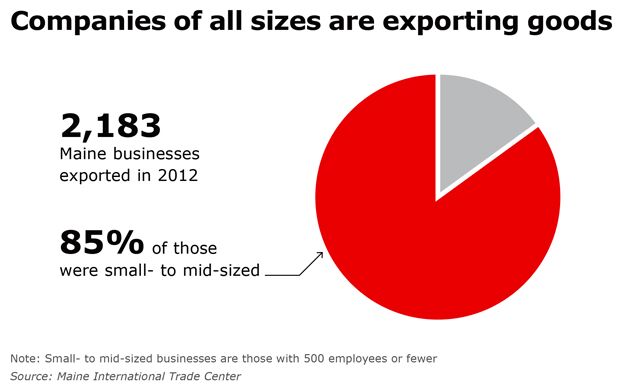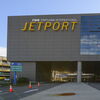With Maine International Trade Center, even small companies can export successfully
Export compliance may not sound like a sexy topic compared to the excitement of selling products internationally. But it can get exciting quickly if you ignore it: civil penalties for export license violations or sending sensitive goods to banned countries, for example, can run up to $250,000 per violation, and criminal penalties can carry jail time with fines topping $1 million, experts say. Companies may even be prohibited from exporting going forward.
“A lot of companies in Maine don't have compliance offices,” says Janine Bisaillon-Cary, director of the Maine International Trade Center, which helps companies export and import.
Companies like IDEXX are large enough to have internal compliance offices, Bisaillon-Cary says, but most Maine companies are small- to medium-sized enterprises, and have to rely on freight forwarders, consultants, groups like MITC and others to make sure they're selecting the correct paperwork to export a certain type of sneaker, for example, rather than a boot in the regulator's list of codes for export products.
“These businesses, if not properly trained, can face serious penalties if they don't fully comply to export regulations,” Tom Conley, international trade specialist at MITC, writes in an email. Some 85% of Maine's 2,183 those that exported in 2012 were small- or mid-sized companies, defined as having 500 employees or fewer.
International trade is a major contributor to jobs in Maine, with 177,519 workers. Exports totaled $2.74 billion in 2015, about double the $1.38 billion in 1996.
Compliance need not be a roadblock
Bisaillon-Cary and others say first-time exporters shouldn't be scared off by the paperwork, time, research and potential fines. MITC, consultants, trade lawyers, some freight forwarders and other agencies offer help to navigate export compliance for each shipment of a product and steer companies around the do's and don'ts.
For example, MITC is holding a full-day training session on export compliance June 16 in Brunswick at TechPlace headed by Mike Allocca of Allocca Enterprises Inc. of York, S.C. He has a background in freight forwarding and export compliance.
“There are 41 partner federal government agencies that can regulate exports,” Allocca says. “Exporters need to know who to go to.”
While exporters may seek advice from others, they ultimately hold the responsibility for any problems with everything from export paperwork to doing due diligence on their customers. They are responsible for assuring the end users are actually the ones receiving and using the businesses' products, and that the products don't end up in a banned country or with an illegal user.
That MITC workshop with Allocca will cover a wide spectrum of the issues beyond paperwork that exporters need to know to avoid pitfalls. On the agenda are new export security requirements, a checklist to guide businesses through compliance on every export, using due diligence to avoid sanctioned countries, identifying common red flags an overseas customer may raise, country-specific requirements and export documentation.
An important part of the session will be on how to determine if an export license is required, as that is a common mistake among exporters, whether your products qualify for NAFTA treatment, if you are using the correct product export code, number and where to find this information. Insurance, packaging, labeling and record-keeping strategies and responsibilities also will be covered.
MITC's Conley says fees for such training may be reimbursed to eligible small businesses by the Small Business Administration's State Trade and Export Promotion, or STEP grant. MITC administers STEP in Maine, aiming to increase the number of businesses that export.
Where to start
Kelly L'Heureux, general manager of OCEANAIR Inc., a broker and freight forwarder in Falmouth, says such seminars, in addition to consultants, online webinars and some freight forwarders, can help beginning exporters as well as those who are already exporting but feel they need to update their skills due to changing market conditions and regulations.
“People are doing multiple tasks in their jobs,” she notes, so boning up on the details of compliance helps. After several runs through exporting products, companies can even handle simple exports on their own.
While not all freight forwarders help shippers assure they have all the needed paperwork, L'Heureux says OCEANAIR does, and agencies like MITC can help with referrals to those who do.
But even L'Heureux looks to outside consultants to handle complex shipments. OCEANAIR signed a joint venture with Mohawk Global Trade Advisors of North Syracuse, N.Y., an international trade consultancy for that purpose.
Kristin Morneau, who works out of New Hampshire for Mohawk Global, says international trading is becoming more active and complex as the world becomes more global, even for smaller companies in Maine. “The chances of getting fines and penalties are going up with stronger export enforcement,” Morneau says. “Organizations have to analyze the risks of venturing into a particular market.”
And while the smallest fine for a mistake, intended or not, can be as low as $1,000, companies with repeated violations risk up to $ 1 million in fines and/or imprisonment, L'Heureux says. “Just as bad can be the damage to a company's reputation.”
Violations and penalty letters from the government can be found on the U.S. Department of Commerce Bureau of Industry and Security website.
One trade violation of significance was Maine Biological Labs of Winslow being cited for unlicensed export of avian vaccine containing Newcastle virus to Syria. MBL provided two shipping documents indicating “that the goods were not of Israeli origin.” According to the bureau's documentation, the lab also failed to report the receipt of the buyer's shipping instruction, which supported an unsanctioned foreign boycott.
In 2005, two former employees of the lab and a consultant were sentenced to two years' probation; five others were sentenced to terms of imprisonment ranging from nine months to 12 months and one day. The former employees were also fined $5,000 to $30,000. MBL was slapped with a criminal fine of $500,000 in 2005.
The lab is still operating, but under new management, and is a division of the German firm Lohmann Animal Health Gmbh.
Overall, L'Heureux says some trade violations are purposeful, but others are made in the excitement of a company going international and blindly trusting unknown customers or agents that they would otherwise vet in detail at home.
Potential pitfalls are everywhere
One thing Morneau, Allocca and other experts stress to clients is that exporting cannot be taken for granted. It can be taken away for certain violations.
Allocca says the wisest policy is to write business export plans and follow the laws, regulations and best practices to keep out of trouble.
“World-class companies to me are proactive,” he says. “They come to training before there's a problem,” rather than proceeding and hoping they are doing everything right on their own. Potential pitfalls are everywhere, for example, dealing with 220 countries with 18,000 harmonized shipping codes, each with their own regulations and assuring contracts are in order along with all other paperwork. The aim of advice or seminars is to mitigate the risk of making a misstep, he says.
“People put the cart before the horse,” Allocca says. “This is something companies of all sizes can take on.”
But he emphasizes that “exporting is a privilege and not a right, and it can be revoked.”
Read more
Maine International Trade Center receives highest export honor















Comments